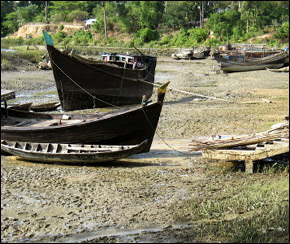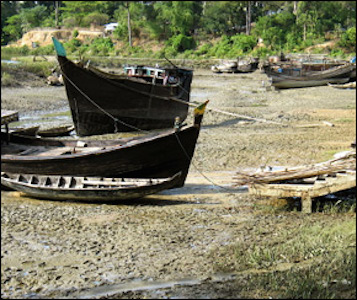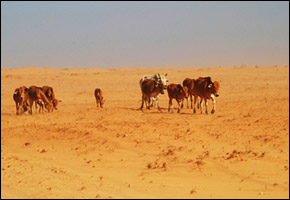Bangladeshi Prime Minister Presses India for Water Deal During Visit
 The two leaders discussed river sharing and hydroelectric power plants during their January 11 meeting.
The two leaders discussed river sharing and hydroelectric power plants during their January 11 meeting.
No agreement on sharing the Teesta River was signed when Bangladeshi Prime Minister Sheikh Hasina met today with her counterpart Manmohan Singh, but Hasina continued to push for a deal similar to the Ganges Treaty, according to Bangladesh’s Daily Star newspaper.
“To ensure such a regular flow of the Ganges water, our two countries concluded the historic 30-year Ganges Water Treaty in 1996 which symbolized the true spirit of what our two countries can do,” Hasina said, according to the Daily Star.
“With the same spirit, we need to conclude treaties on water sharing of the river Teesta and other common rivers. On this very important issue, I request your support in arriving at mutual agreements,” she added.
Secretary-level meetings last week brought the two sides closer to an agreement, but further negotiations are needed before a deal can be reached. River agreements between India and Bangladesh need to be authorized by a minister-level meeting of the Joint Rivers Commission – the forum used to address water problems between the two countries.
“[The Bangladesh government] has already sought a date for the minister-level meeting from India,” said Foreign Minister Dipu Moni to the Daily Star.
The largest irrigation projects in Bangladesh rely on water from the Teesta — an estimated 750,000 hectares of land are irrigated by the river.
A 1983 understanding between the countries gave India 39 percent of the flow and Bangladesh 36 percent, with the remainder allocated according to natural flows. Bangladesh would like a guaranteed dry season flow in a new treaty.
Prime Minister Hasina also used the meeting to raise concerns about India’s proposed Tipaimukh dam, according to Moni. India’s government has approved plans for a 1,500 megawatt dam on the Barak River in the northeastern state of Manipur. Meanwhile India claims the dam would be used for power generation only and would not reduce the flow of water downstream.
Environmental experts from both countries say that building the dam could cause two rivers in Bangladesh downstream from the dam to dry up, Reuters reports.
The opposition Bangladesh Nationalist Party has come out strongly against Tipaimukh. Opposition leader and former Prime Minister Khaleda Zia threatened street protests if Hasina approves the dam, according to Reuters.
But India and Bangladesh are deeply, hydrologically linked — they have 54 rivers in common, including the massive Ganges-Brahmaputra basin. The Joint Rivers Commission was established in 1972 to facilitate cooperation over the development of shared rivers.
Sources: Daily Star, Reuters

Brett writes about agriculture, energy, infrastructure, and the politics and economics of water in the United States. He also writes the Federal Water Tap, Circle of Blue’s weekly digest of U.S. government water news. He is the winner of two Society of Environmental Journalists reporting awards, one of the top honors in American environmental journalism: first place for explanatory reporting for a series on septic system pollution in the United States(2016) and third place for beat reporting in a small market (2014). He received the Sierra Club’s Distinguished Service Award in 2018. Brett lives in Seattle, where he hikes the mountains and bakes pies. Contact Brett Walton









Many observers on this issue are agreeing that deals over natural resources, especially water, will be common-place over the next decade and beyond. Professor Stewart Burn has written an essay for the Future Agenda Project in which he outlines the future of water as a resource and the challenges surrounding it, stressing its importance as “the only natural resource with no substitute” and how “overall demand for freshwater will exceed supply by more than 50% by 2025 and so the number of people living in water stressed regions will increase”: http://www.futureagenda.org/?cat=5.